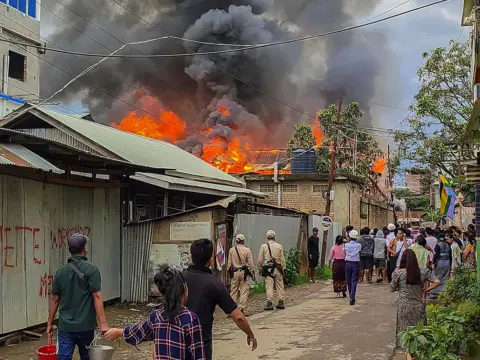
INDIA GREENS PARTY
Press Statement
Issued at New Delhi on 2 December 2024
On this solemn occasion, marking the 40th anniversary of the Bhopal Gas Tragedy, the India Greens Party stands in remembrance of the thousands of lives lost, the countless families affected, and the ongoing legacy of environmental degradation and public health crises in Bhopal and across the nation.
The tragedy, which claimed thousands of lives and left many more with long-term health consequences, serves as an indelible reminder of the dangers of unchecked industrial negligence and the imperative of robust environmental safeguards.
The Bhopal disaster was a wake-up call for India and the world about the catastrophic risks posed by industrial pollution. Yet, in the years since, instead of learning from this devastating event and strengthening our commitment to protecting people and the natural environment, we have witnessed a disturbing pattern of environmental law dilution, regulatory backsliding, and growing industrial pollution in every corner of India.
“We must not forget that the people of Bhopal are still living with the consequences of that fateful night. Today, the legacy of toxic contamination continues to affect the health of residents, their children, and future generations,” pointed out Mr Kailash Anerao, Co-President of the India Greens Party.
“It is not just Bhopal—across India, industrial pollution is poisoning the air we breathe, the water we drink, and the soil that nourishes our crops. The impact on public and health of other voiceless species is staggering: rising rates of respiratory diseases, cancers, neurological disorders, and reproductive health issues are all linked to increased exposure to toxic pollutants,” Mr Anerao added.
In recent years, the India Greens Party has been deeply concerned by the following trends:
- Dilution of Environmental Laws: Over the past decade, we have witnessed a systematic erosion of environmental protections and dilution of all environmental safeguards & penal provisions. Key environmental regulations have been weakened, allowing polluting industries to bypass strict scrutiny and engage in hazardous practices without adequate safeguards. Moreover, several vital provisions of the National Green Tribunal (NGT) Act have been undermined, limiting access to justice for affected communities.
- Relaxed Pollution Norms: Despite mounting evidence of widespread industrial pollution, the government has consistently relaxed pollution control standards to accommodate the demands of industry. These changes, which allow industries to discharge more toxins into our air, water, and soil, put public & biodiversity health at significant risk.
- Worsening Air Quality: Air pollution is one of India’s most pressing public health crises. Major industrial hubs, urban centres, and coal-dependent regions are choked by hazardous levels of particulate matter (PM2.5), which contribute to respiratory illnesses, heart disease, and premature deaths.
- Toxic Water Contamination: From chemical discharges into rivers to heavy metal contamination of groundwater, the contamination of India’s water sources has reached alarming levels. Thousands of communities, especially those near industrial zones, are drinking polluted water, leading to a surge in waterborne diseases and long-term health effects like kidney damage and cancer.
- Soil Contamination: Large-scale industrial waste disposal and pesticide use have resulted in widespread soil contamination, rendering vast areas of agricultural land unfit for cultivation. This not only undermines food security but also exposes farmers and their families to harmful chemicals, resulting in health risks.
Impact on Public Health
The effects of industrial pollution on human health are profound and devastating. Chronic exposure to toxic chemicals, heavy metals, and industrial waste is linked to a range of diseases, including:
- Respiratory conditions like asthma, bronchitis, and lung cancer
- Neurological disorders, particularly in children, including developmental delays and cognitive impairments
- Increased rates of cardiovascular diseases
- Reproductive health issues, including birth defects, infertility, and stillbirths
- Widespread waterborne diseases and gastro-intestinal disorders
The Bhopal Gas Tragedy was a tragedy of unprecedented proportions, but it is far from unique. The increasing industrial pollution across India demands urgent action, not just to mitigate the ongoing damage but to prevent future tragedies.
Need of the Hour: Pressing Demands
On this 40th anniversary, the India Greens Party calls on the Narendra Modi government to take immediate, comprehensive action to address the following critical issues:
- Strengthening Environmental Laws: Reinstate and rigorously enforce the environmental laws viz. the Air & Water Pollution Laws that protect public health, including the Environment Impact Assessment for all projects and stricter regulations for industrial waste disposal. Industries and their owners must be held personally accountable for their role in pollution.
- Strict Pollution Control: Implement and enforce more stringent pollution standards for industries, particularly in sectors such as chemical manufacturing, mining and power generation. Monitoring of pollution levels should be transparent, with real-time data made publicly available.
- Clean-up and Remediation of Polluted Sites: Invest in long-term environmental remediation programs for areas severely affected by industrial pollution, particularly in and around industrial zones, mining regions, and old chemical plants.
- Strengthening Public Health Systems: Increase funding for healthcare in polluted areas, ensuring access to free treatment for diseases linked to industrial pollution. This includes setting up specialized treatment centres for diseases like cancer, respiratory illnesses, and mental health disorders caused by toxic exposure from industrial accidents.
- Promoting Community-Led Environmental Justice: Empower local communities to fight for their right to clean air, water, and soil. We demand a transparent, community-driven process in decision-making, especially for areas that are environmentally vulnerable due to industrial activities.
The Bhopal Gas Tragedy is not a chapter that India should put behind. It must remain a symbol of both the dangers of industrial negligence and the need for vigilance, accountability, and action in the face of growing environmental challenges. The tragedy that struck Bhopal 40 years ago can never be erased, but we must ensure that it becomes a catalyst for positive change—a movement towards a cleaner, healthier, and more sustainable India.
The India Greens Party honours the memory of those who perished in Bhopal and stand in solidarity with the survivors and affected communities. We also stand united with the citizens across India who fight against the unprecedented air and water pollution crisis in India. Industrial pollution in India now poses a significant threat to biodiversity, with impacts ranging from habitat destruction to chemical contamination, air and water pollution, and climate change.
– Issued by Suresh Nautiyal, Chief Spokesperson of iGP
………………………………………………………………………..
(India Greens Party is registered with the Election Commission of India under Section 29A of the Representation of the People Act, 1951. Registration Number: 56/476/2018-19/PPS-I, effective from 18/07/2019.)
National Head Office: GreenDham AnandiChait, IndraBalbhadra Parisar, Unchir-Dunktok, SH-31, PO-Ghurdauri, Distt-Pauri Garhwal, Uttarakhand, INDIA. PIN-246194.
Email: contact@indiagreensparty.org Website: https://indiagreensparty.org





You must be logged in to post a comment.